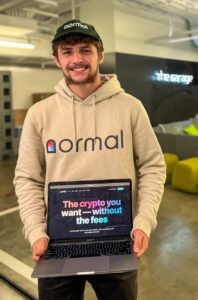CCryptocurrencies are poised to disrupt and radically transform monetary systems across the world, Joshua Blew said, noting that the coming financial freedom offered by such developments is closely tied to individuals having access to the best tools and owning the right assets.
But connecting with them in a world of banking behemoths and established financial institutions can be a challenge, the Rayton native said.
Blew’s startup, Normal — a Chicago-based cryptocurrency trading platform with an ETF (exchange-traded fund) twist — aims to revolutionize a growing blockchain market, he said.
Since he started building it about three years ago, his fledgling company has already helped more than 100 investors from seven countries diversify $200,000 into crypto while saving them more than $5,000 in trading fees, Blew said.
One of the key strategies is to keep the investor in control, he explained.
Like traditional financial giants like BlackRock They are slowly starting to include crypto in their offerings, they use a model where neither they nor the investor own the actual coins, but the investor owns the product of the financial institution – shares in an ETF, for example.
In such situations, large companies offer investors access to only a few cryptocurrencies, such as Bitcoin, Ethereum, etc., which are considered more stable than others, Blew explained.

Justin Benjamin, Co-Founder and COO at Normal
Normal retains ownership of the coins with the investor and helps them diversify their holdings across coins of their choice, he said. This allows Normal to provide investors with access to a much broader range of coins — more than 200, he added.
The startup’s structure also opens its services to global investors, Blew noted, allowing its platform to avoid “the millions of dollars in legal fees and the years it takes to build these indices that someone like BlackRock would have to do.”
Normal’s approach to asset ownership also sets it apart, he said.
Typically, institutional crypto ETFs don’t hold cryptocurrencies for their investors. Instead, they partner with a custodian, usually a Coinbase Or GeminiBlew explained.
“The custodian is actually the owner of your assets,” he said. “But with our model, you’re actually the custodian of your assets, which is kind of called self-custody. And so with self-custody, you have two important benefits.
“First of all, it increases your security, so you can move that cryptocurrency into a wallet or ownership structure of your choice that you can really tailor to your needs,” Blew said. “You can also trade your assets 24/7, you’re not limited to traditional exchange hours of Monday through Friday, 9 a.m. to 5 p.m..”
Normal is also developing its platform to revolutionize dividend creation, he added.
“You can lend your crypto to lending networks on the blockchain, or you can stake it — but those are basically just interest-generating opportunities that you can use to earn passive income on your assets,” he said, noting that the startup’s interest-generating offerings are expected to go live in the coming weeks.
Next step: earning Normal’s RIA (Registered Investment Advisor) status, a key indicator of transparency strength.
The right skills from the start
By the age of 16, Blew was learning to code and trade penny stocks. In 2020, before he even graduated from DePaul University, he was working full-time as a senior software engineer at a Kansas City-based banking UX startup. Finottecreation of APIs and front-end interfaces.
Trading penny stocks, coding and working closely with the financial industry eventually led Blew to discover Bitcoin and cryptography, he said.

Joshua blew, normal
Tom Woodward, Blew’s former teacher at Summit Technology Academy, knew from the start that Normal’s founder was special.
“Josh came to me one day and he had written a program to try to guess stock prices,” Woodward said. “I didn’t understand it, but I thought, ‘Wow, this kid is really special.’”
Woodward corroborated Blew’s early interest in investing and computer science, saying he rarely saw students interested in both.
“I was actually teaching a finance and fintech program,” Woodward said, “and he was one of the few students interested in both sides of the field.”
Woodward recalls including a quote from Warren Buffett in his email signature when he worked as an educator, the famous “three qualities” quote:
“Someone once said that to recruit, you need three qualities: integrity, intelligence and energy. And if you don’t have the first, the other two will kill you.”
“Josh has the energy, he certainly has the intelligence, but he has a fantastic moral compass,” Woodward said, adding that the drama in the crypto space in recent years led Blew to pivot Normal “a few times in light of people who didn’t have that integrity.”
Citing the Sam Bankman-Fried scandal — involving a high-profile cryptocurrency fraud — Woodward said Blew “remained nimble and true to himself.”
A normal future as the new normal
Startups founded by individuals like Blew have the potential to reshape the economy in areas where their more traditional predecessors have failed to evolve for the better — especially not for the benefit of regular people, he said. Dr. Alex Cahana.
“I don’t think BlackRock is a company that shares the same values or worldview that I do,” said Cahana, a venture partner at Enterprise Escalator. Impact rooms.
“The reason they use crypto is because it’s peer-to-peer technology. It saves them a lot of money, reduces their overhead, and increases their margins… But the fundamental problem is that they don’t care about my well-being. They may say that, but that’s not how it translates into their day-to-day work.”
Cahana is an advocate for decentralization, finance, healthcare, and other key sectors. In the field of cryptocurrencies and finance, he is a proponent of a future in which individuals are their own banks. In this scenario, banks would become more of a platform, a facilitator of connections between individuals.
The key to this vision, however, lies in an individual’s willingness to do due diligence, he added.
“What’s difficult about crypto is the DYOR. You have to do your own research,” Cahana said. “What’s confusing and what you have to be wary of, or alert your readers about, is the branding.”
“It’s like when you go to the supermarket, how do you know what you’re going to buy isn’t healthy? It says ‘healthy, natural, organic’, all that… And if you look at the ingredient list, you see there are 70 ingredients in it. So you know it’s not healthy.”
The same goes for cryptocurrency, he said.
“You just have to understand the ingredients. And that’s where the difficulty lies,” Cahana continued. “If you don’t understand, read the code, go to GitHub and read the code. And that’s what people don’t do.”
Crypto indices like Normal “are probably the closest thing to independence. And that’s why it’s a good choice because they use an index, they create ETFs, they customize it,” he said. “You understand the mechanics of it, and the fees are low compared to others and traditional finance.”





